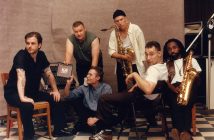Achtung Baby marks the point at which U2 swapped the politically-themed lyrics for the personal, and found musical inspiration in the more inventive electronica, psychedelic dance beats of the early ‘90s to fuse with their guitars, drums and Bono’s unmistakable voice.
Achtung Baby was released in 1991 after (though not immediately) The Joshua Tree (‘Where the Streets Have No Name’, ‘With or Without You’ and ‘I Still Haven’t Found What I’m Looking For’) and before All That You Can’t Leave Behind (‘Beautiful Day’, ‘Stuck In A Moment You Can’t Get Out Of’) – perhaps the two most familiar of the 12 studio albums U2 have released since their formation in 1976, though critics frequently cite Achtung Baby as the best.
The stand-out tracks from Achtung Baby are rightly the epic, ‘One’, and the funky ‘Mysterious Ways’ – classic U2 stadium-fillers. So do the other tracks deliver the same standard and does the album work as a whole? Well…yes.
The album begins with ‘Zoo Station’, an audacious, heavily distorted track held together with an undemanding melody, followed by ‘Even Better Than The Real Thing’, with catchy hooks and many layers of sound. ‘One’ then blows you away with its slowly building, spiritual outpouring; one of those moments where you believe the combination of lyrics and music must have been completely instant and natural – indisputably genius and one of U2’s finest songs.
Other highlights include the drifting, piano-led ‘So Cruel’, where guitars take a backseat in an almost calm, reflective contrast to the following, ‘The Fly’, the first single from the album, and then the joyful ‘Mysterious Ways’, one of my favourite of all U2 tracks. There are less satisfactory moments; ‘Tryin to Throw Your Arms Around the World’ is not brilliant and, along with one or two other tracks, is fairly unmemorable.
The odd percussion and blurred samples in ‘Love is Blindness’ help create a hypnotic, dream-like ending to Achtung Baby, which is an almost uncomfortable finish, something much more original than previous works by the band.
What makes this album significant is the risk the band took in departing so dramatically from their previous themes and style and the success that it achieved; creative ambition in this instance paid off. The Edge was on top form with punk-like riffs, Bono- the sole lyricist for this album- merged lines about troubled relationships, loneliness and spirituality with distinctive melodies and textures, and the input from producer Brian Eno is apparent in the embracing of new technology, experimentation, and the transformation of the band.


![Midge Ure on Legacy, Live Aid, and his upcoming ‘Catalogue’ tour: ‘The idea that there could be an [AI] Ultravox in 40/50 years from now is terrifying’](https://theedgesusu.co.uk/wp-content/uploads/2024/03/download-214x140.jpg)

